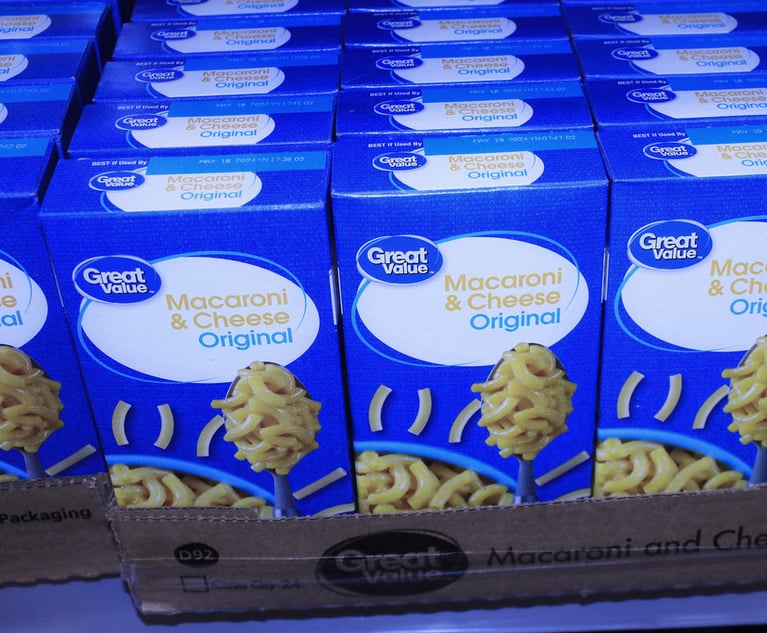Securities Suit Against Chicken Producer Is Tossed by Second Circuit Panel
The panel turned aside arguments that the courts should not apply the pleading standards of securities law to antitrust factual claims at the heart of the suit.
December 10, 2019 at 03:05 PM
4 minute read
 Poultry Meat Processing. Photo: iStockphoto.com.
Poultry Meat Processing. Photo: iStockphoto.com.
The Second Circuit U.S. Court of Appeals has upheld the dismissal of a securities fraud class action against Sanderson Farms Inc., finding that investors had not adequately supported allegations that the company conspired with other chicken producers to control supplies and drive up prices.
The ruling Tuesday, from a unanimous panel, was a win for Mississippi-based Sanderson Farms, the country's third-largest poultry producer, and its Kirkland & Ellis attorneys, who succeeded in having the lawsuit dismissed last year.
Sanderson Farms investors Gordon Gamm and Don Pritchard had alleged in the complaint that the agribusiness failed to disclose a secret plot to manipulate natural "boom and bust" cycles in the chicken market to capitalize on high prices.
In order to keep chicken supplies low, Sanderson and other industry leaders destroyed breeding hens and eggs and then dumped their excess inventories on foreign markets, the plaintiffs said. According to the complaint, the companies organized their scheme at a series of industry meetings and conferences and tracked each other's reductions by monitoring industry data reports.
U.S. District Judge Richard M. Berman of the Southern District of New York dismissed the suit last January, finding that the antitrust allegations at the heart of the investors' security claims were too vague to survive dismissal.
The panel turned aside arguments that the courts should not apply the pleading standards of securities law to antitrust factual claims at the heart of the suit.
Plaintiffs' team of Pomerantz attorneys argued that—while the particularity standard would apply to securities-law disclosure allegations—the facts of the underlying antitrust conspiracy only needed to meet the lower bar of Rule 8 plausibility.
There was "no public policy reason," they said, to use a heightened pleading standard for allegations of anti-competitive conduct "simply because they underpin a securities fraud class action."
But Judge Ralph K. Winter Jr. of the U.S. Court of Appeals for the Second Circuit said district courts in the Second Circuit have consistently held that the particularity standard applies to alleged illegal acts when they form the basis for a nondisclosure claim.
"The clear language of the statute, the existing case-law, and the stated intent of the securities laws all lead us to recognize that, when a complaint claims that statements were rendered false or misleading through the non-disclosure of illegal activity, the facts of the underlying illegal acts must also be pleaded with particularity," Winter wrote.
Gamm and Pritchard, meanwhile, had failed to identify any kind of tacit agreement between the companies and provided "virtually no explanation" of how the alleged scheme might have worked. Absent any clearer details, Winter said, the complaint had alleged nothing more than parallel conduct that could not be seen as evidence of coordinated action.
"Appellants provide no facts alleging that Sanderson or its peers actually reduced supply, and that these reductions were 4 the result of an agreement, or were even interrelated," he said in the opinion, joined by Judges John M. Walker Jr. and Christopher F. Droney of the U.S. Court of Appeals for the Second Circuit.
Attorneys for both sides were not immediately available to comment on the ruling, and Sanderson's press office did not immediately respond to a request for comment.
The plaintiffs were represented by Tamar Weinrib, Marc I. Gross and Jeremy A. Lieberman of Pomerantz in New York.
Sanderson was represented by Joshua Rabinovitz, Robert J. Kopecky, Nathaniel J. Kritzer and Stacy Pepper from Kirkland's offices in New York and Chicago.
The case was captioned Gamm v. Sanderson Farms.
READ MORE:
Second Circuit Revives Lawsuit Against Ohio Drugmaker, Saying Judge Mishandled Jurisdictional Query
Gibson Dunn's Boutrous Asks 2nd Circuit to Uphold Dismissal of City's Climate Change Suit
This content has been archived. It is available through our partners, LexisNexis® and Bloomberg Law.
To view this content, please continue to their sites.
Not a Lexis Subscriber?
Subscribe Now
Not a Bloomberg Law Subscriber?
Subscribe Now
NOT FOR REPRINT
© 2025 ALM Global, LLC, All Rights Reserved. Request academic re-use from www.copyright.com. All other uses, submit a request to [email protected]. For more information visit Asset & Logo Licensing.
You Might Like
View All

NYC’s Oldest Deli Agrees to Update Bathrooms, Entrances to End ADA Charges
4 minute read
Ben & Jerry’s Accuses Corporate Parent of ‘Silencing’ Support for Palestinian Rights
3 minute read
Walmart Accused of Misrepresenting 'Cheese' Ingredients in Great Value's Macaroni & Cheese
3 minute readLaw Firms Mentioned
Trending Stories
- 1Thompson Coe, 2 Lawyers, Hit by $1M+ Legal Mal Suit
- 2Regulatory Intelligence Platform Abstract Announces $4.8 Million in Seed Funding
- 3Former Sacks Weston Partner Faces 5-Year Suspension Over Mail, Wire Fraud Conviction
- 47th Circ. Revives Transactional Dispute Against Military Retailer, Sends to State Court
- 5Lavish 'Lies' Led to Investors Being Fleeced in Nine-Figure International Crypto Scam
Who Got The Work
Michael G. Bongiorno, Andrew Scott Dulberg and Elizabeth E. Driscoll from Wilmer Cutler Pickering Hale and Dorr have stepped in to represent Symbotic Inc., an A.I.-enabled technology platform that focuses on increasing supply chain efficiency, and other defendants in a pending shareholder derivative lawsuit. The case, filed Oct. 2 in Massachusetts District Court by the Brown Law Firm on behalf of Stephen Austen, accuses certain officers and directors of misleading investors in regard to Symbotic's potential for margin growth by failing to disclose that the company was not equipped to timely deploy its systems or manage expenses through project delays. The case, assigned to U.S. District Judge Nathaniel M. Gorton, is 1:24-cv-12522, Austen v. Cohen et al.
Who Got The Work
Edmund Polubinski and Marie Killmond of Davis Polk & Wardwell have entered appearances for data platform software development company MongoDB and other defendants in a pending shareholder derivative lawsuit. The action, filed Oct. 7 in New York Southern District Court by the Brown Law Firm, accuses the company's directors and/or officers of falsely expressing confidence in the company’s restructuring of its sales incentive plan and downplaying the severity of decreases in its upfront commitments. The case is 1:24-cv-07594, Roy v. Ittycheria et al.
Who Got The Work
Amy O. Bruchs and Kurt F. Ellison of Michael Best & Friedrich have entered appearances for Epic Systems Corp. in a pending employment discrimination lawsuit. The suit was filed Sept. 7 in Wisconsin Western District Court by Levine Eisberner LLC and Siri & Glimstad on behalf of a project manager who claims that he was wrongfully terminated after applying for a religious exemption to the defendant's COVID-19 vaccine mandate. The case, assigned to U.S. Magistrate Judge Anita Marie Boor, is 3:24-cv-00630, Secker, Nathan v. Epic Systems Corporation.
Who Got The Work
David X. Sullivan, Thomas J. Finn and Gregory A. Hall from McCarter & English have entered appearances for Sunrun Installation Services in a pending civil rights lawsuit. The complaint was filed Sept. 4 in Connecticut District Court by attorney Robert M. Berke on behalf of former employee George Edward Steins, who was arrested and charged with employing an unregistered home improvement salesperson. The complaint alleges that had Sunrun informed the Connecticut Department of Consumer Protection that the plaintiff's employment had ended in 2017 and that he no longer held Sunrun's home improvement contractor license, he would not have been hit with charges, which were dismissed in May 2024. The case, assigned to U.S. District Judge Jeffrey A. Meyer, is 3:24-cv-01423, Steins v. Sunrun, Inc. et al.
Who Got The Work
Greenberg Traurig shareholder Joshua L. Raskin has entered an appearance for boohoo.com UK Ltd. in a pending patent infringement lawsuit. The suit, filed Sept. 3 in Texas Eastern District Court by Rozier Hardt McDonough on behalf of Alto Dynamics, asserts five patents related to an online shopping platform. The case, assigned to U.S. District Judge Rodney Gilstrap, is 2:24-cv-00719, Alto Dynamics, LLC v. boohoo.com UK Limited.
Featured Firms
Law Offices of Gary Martin Hays & Associates, P.C.
(470) 294-1674
Law Offices of Mark E. Salomone
(857) 444-6468
Smith & Hassler
(713) 739-1250






